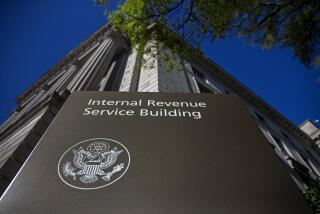IRS Eases Rules on Donations
Taxpayers who donated money after the Sept. 11 terrorist attacks but who have yet to receive an acknowledgment of their charitable contributions have six more months to try to document their generosity, the Internal Revenue Service said Wednesday.
The IRS said it is loosening the paperwork rules because charities have been so overwhelmed by donations that many have fallen far behind in sending out acknowledgment letters.
Taxpayers who donate $250 or more normally are required to have a letter or e-mail from the charity acknowledging the gift before claiming a deduction on their individual tax returns. This documentation is not filed with the return, but by IRS rules must be kept in the taxpayerâs files.
The IRS now says taxpayers who made contributions between Sept. 11 and Dec. 31, 2001, can claim a deduction on their 2001 returns as long as they get the documentation by Oct. 15 or show a âgood-faith effortâ that they tried to obtain it.
Such efforts could include a letter or e-mail to the charity, with a copy kept for the taxpayerâs files, the IRS said.
Americans have flooded charities with more than $2 billion in Sept. 11-related donations, according to the Chronicle of Philanthropy, and many smaller or newly formed nonprofits are struggling to send out charitable receipts to donors. The IRS said nearly 300 new charities sprang up after the attacks.
The nationâs largest charities have automated the process of sending out contribution acknowledgments, tax experts said. Some--such as the American Red Cross--send out receipts within seconds of receiving an online contribution on its Web site.
Taxpayers are supposed to present this documentation if their return is audited. Canceled checks arenât considered sufficient documentation, tax experts said.
The new rules affect only the one-third of Americans who itemize deductions, because only taxpayers who itemize are allowed to write off charitable contributions. Although President Bush is in favor of allowing such deductions for all taxpayers, Congress has yet to concur.
Documentation isnât required for donations of less than $250, or for a series of smaller donations that add up to more than $250--such as a weekly contribution of $25 to a church or synagogue, tax experts said.
In 1997, the latest year for which IRS statistics are available, Americans claimed $126 billion in deductions to charities, an average of $3,100 for each taxpayer who itemized.
Even though most Americans donât itemize, more than 90% of American households donate to charities, according to the Chronicle of Philanthropy.
The change in charitable donation rules is the latest IRS effort to accommodate taxpayers who have struggled after the attacks.
Taxpayers who lived or worked in the disaster area, or whose tax documents were destroyed when the World Trade Center buildings collapsed, were given extra time to file and pay taxes, such as quarterly estimated tax payments, that were due last year.
The disaster area included New York and Arlington County in Virginia, home of the Pentagon.
More to Read
Sign up for Essential California
The most important California stories and recommendations in your inbox every morning.
You may occasionally receive promotional content from the Los Angeles Times.










